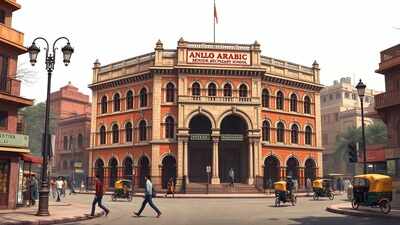ARTICLE AD BOX

Tucked behind the busy Ajmeri Gate in Old Delhi stands a school that has witnessed the rise and fall of empires, the transformation of a city, and the reshaping of education in India.
Anglo Arabic Senior Secondary School is not just one of the oldest running schools in the country, it’s a living archive of India's cultural, political, and academic evolution.What began in 1696 as a modest madrasa founded by a Mughal general has grown into a school that continues to educate hundreds of students each year, carrying forward a legacy built across centuries.
The general who planted the first seed
The school’s story begins with Ghazi ud-Din Khan Feroze Jung I, a powerful general in the court of Mughal Emperor Aurangzeb.
Known for his military prowess in the Deccan and as the father of Qamar-ud-din Khan, the first Nizam of Hyderabad, Ghaziuddin Khan founded a madrasa outside the walled city of Shahjahanabad. His vision was to create a centre for Islamic and Persian learning, an idea ahead of its time in 17th-century Delhi.The madrasa, which came to be known as Madrasa Ghaziuddin Khan, was built near Ajmeri Gate and initially flourished as a hub of classical education.
But as the Mughal Empire weakened, the madrasa fell into decline and eventually closed by the early 1790s.
A revival in a changing world
In 1792, just as colonial influence began spreading across India, the madrasa found new life. Backed by local nobility, it was re-established as an oriental college, introducing literature, science, and the arts to its curriculum. This revival marked the school’s first transformation, from a religious institution to a broader seat of learning.Its location, just outside the city's protective walls, earned it the name "College Bastion", hinting at its role as both a fortress of knowledge and a symbol of Delhi’s intellectual resilience.
Arrival of the British and reshaping of the school
In 1828, the British East India Company stepped in. Driven by the colonial goal of educating a local elite fluent in English, they reorganized the school into what became known as the Anglo Arabic College.One of the key figures behind this transformation was Charles Trevelyan, brother-in-law of Thomas Babington Macaulay, whose infamous education policy would go on to shape India’s schooling system for generations.
English language and literature were now taught alongside Arabic and Persian: a fusion that reflected the tensions and aspirations of the time.Under the stewardship of Dr. Sprenger, a visionary principal, the college became even more dynamic. He established a printing press, Matba‘u ’l-‘Ulum, and launched Qiranu ’s-Sa‘dain, the school’s own journal, in 1845, bringing scholarly discourse into print and giving the institution a public intellectual voice.
Teachers who stood for more than academics
The school has not just been shaped by political forces, it has also been defined by the passion of its teachers.One such name is Rao Shamshad Ali Khan, who joined in 1947, the year India became independent. He would go on to serve the institution until 1975, through a period marked by political upheaval and national transformation. A member of the Muslim League, Rao Shamshad was even arrested during Indira Gandhi’s Emergency.
It serves as a reminder that education, politics, and activism have always intersected at Anglo Arabic School.
The alumni who changed India
It’s no surprise that a school with such depth of history has produced alumni who went on to shape India and beyond.Among them:
- Sir Syed Ahmed Khan, who would later found Aligarh Muslim University and become a pioneer of modern Muslim education in India.
- Muhammad Husain Azad, one of Urdu literature’s most celebrated writers.
- Meem Afzal, a journalist, politician and diplomat.
- Akhtar ul Iman, a poet who gave Urdu cinema some of its finest screenplays.
- Mirza Masood, who represented India as a hockey Olympian.
A story captured in print
To ensure that this remarkable journey is never forgotten, two former administrators chronicled the school’s story in a book titled “The School at Ajmeri Gate: Delhi Educational Legacy”, published by Oxford University Press.
The book weaves together facts, personal anecdotes, and historical documents to present the school not just as a building, but as a living institution that has survived war, colonialism, Partition, and Emergency.
A living legacy
Today, under the guidance of Principal Mohd Wasim Ahmad, with Prof. Najma Akhtar, Vice Chancellor of Jamia Millia Islamia, as the Chairperson of the Delhi Education Society, the school continues its mission.
It serves a co-educational student body and remains government-aided: still accessible, still relevant.While the facade of the school has been renovated over the years, the echoes of its past remain: in the architecture, the traditions, and the generations of students who walk through its gates unaware they’re stepping into history.In a world where new schools rise every year with shiny walls and corporate branding, Anglo Arabic School stands out, not because it has the newest tech, but because it has the oldest soul.TOI Education is on WhatsApp now. Follow us here.



.png)
.png)
.png)
















 12 hours ago
3
12 hours ago
3







 English (US) ·
English (US) ·